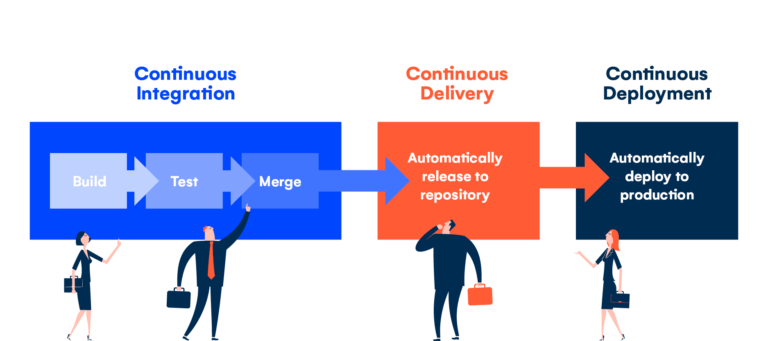Retail & Distribution
CI/CD: a change of mindset for greater agility
3 januari 2023

CI/CD: Top quality security
Consumers today are looking for a more immersive digital shopping experience. So, retailers need to do everything they can to make things as smooth and efficient as possible. Constant innovation makes staying ahead of emerging trends and your competitors ever more important.
What’s really required is a complete change of mindset and an agile IT infrastructure. This means you can introduce new, constantly evolving solutions quickly and easily. It’s no longer enough to wait for new versions released once a year. That’s insufficient to guarantee high levels of security.
Which is why more and more retailers are turning to CI/CD.
What is CI/CD??
Continuous Integration (CI) is something relatively new in software development, where incremental changes to code are regularly made. CI approaches make software development and testing more reliable, with any changes automatically integrated with the database.
Continuous Delivery (CD) puts all developmental code changes into a test or pilot stage environment. This means that new developments can be released ‘live’ whenever necessary, effectively reducing time to market.

What are the advantages of a CI/CD?
CICD gives the DevOps team continuous feedback from customers. Bugs can be detected and rectified more rapidly, increasing speed of delivery.
If you can imagine software updates being something akin to having of an email service like Outlook installed on a workstation, CICD works more like a Webmail service. Unlike native apps, these more modern apps rely on Progressive Webapps (PWAs). Updates are more frequent, but cause less disruption, mainly for two reasons.
Firstly, we’re only talking about minor updates or corrections each time within a limited framework. This more agileapproach means you don’t have to test an entire application with every update. For example, if an update corrects a bug detected within the confines of the product catalogue, you won’t have to waste time checking the point-of-sale elements too.
Secondly, regular updates circumvent the need to do so many major reboots or installations that might disrupt ongoing store activities. Updates can also be administered from afar, regardless of the country that stores are located in.
What are the best practices in retail for cybersecurity?
Why does the cloud make retailers more resilient?
A more efficient omnichannel experience
Being more agile doesn’t mean forgoing security. More and more software developers are turning to the DevOpsSec model. An automated approach puts security at its heart and gives a shared responsibility throughout the application’s design and development lifecycle.
The DevSecOps approach is especially good at automating certain security gateways which prevents slowing down DevOps workflows. It makes it easier to detect bugs and deploy patches securely. As soon as an error is spotted, it’s quickly corrected by going through the various stages of the CICD pipeline.
When all the steps have been validated, the fix is then usually deployed at night (when most stores are closed), so there’s minimal impact on activity.
This allows IT and retail teams to benefit from the latest new features, updates and patches quickly and easily. Cegid’s CICD approach also opens doors to a new generation of retail applications based on different PWAs that deal with core functionalities, like POS, customer management, product catalogues, and so on.
“With retail evolving so fast, new features in Cegid Retail Live Store can be deployed as soon as they come out. Gone are the days when kits are painstakingly installed at the tills. And with such an agile, low-risk, added-value approach, deployment times are reduced from months down to weeks,” said Olivier Chiono, Director of the Retail Offer at Cegid. “What’s more, by introducing regular upgrades, store staff can provide a more streamlined omnichannel shopping experience and retailers become more effective and competitive.”
To conclude, CICD is a tried and tested means of speeding up a retailer’s digital transformation. By automating the entire software development process, it allows retailers to quickly benefit from the latest functionalities and improve the shopping experience.
Cegid Retail Live Store
Set a new pace for your business with Cegid Retail Live Store, a new generation of collaborative in-store apps based on CICD.
- Less complicated processes for IT staff updating every till across a retail network
- More regular upgrades
- Faster fixes for minor bugs,
- Automated processes reduce the risk of error and improves responsiveness
- No disruption to store activities
- Greater agility for meeting the evolving needs of the customer


